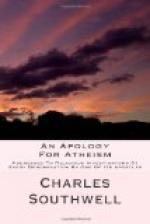bigotry of Catholics they hurl the fiercest denunciations;
but if called upon to denounce as fiercely the bigotry
of Protestants, they make us understand ’the
case being altered, that alters the case.’
A Popish Inquisition they abhor, but see no evil in
Inquisitions of their own. Smithfield Auto da
Fe’s, according to these consistent Christians,
were wrong during the reign of Mary, and right during
the reign of her pious sister, ‘Good Queen Bess.’
Such is the justice of superstition. Its votaries
knowing themselves the favoured of heaven, feel privileged
to outrage and trample under foot the great principles
of sense, propriety, and honour. Between Catholics
and Protestants as regards these principles there is
little to distinguish; for in the race of abomination,
they have kept pretty nearly neck and neck. The
author of this Apology has no sympathy with either,
but of the two much prefers Popery. There is about
it a breadth of purpose, a grandeur, and a potency
which excites some respect, even in the breast of
an enemy. Unreasonable it assuredly is, but Christians
who object to it on that ground, may be told—religion
was never meant to be reasonable; and that an appeal
to rational principles will as little avail one religion
as another, as little avail Protestant as Roman Catholic
faith. All religion is unreasonable, and, moreover,
to rationalize would be to destroy it. Hobbes
could discover nothing in superstition essentially
different from religion, nor can we. He deemed
true religion as the religion which is fashionable,
and superstition as the religion which is not fashionable.
So do we, so do all absolute Atheists. The notion
that false religion implies the true, just as base
coin implies the pure, will have weight with those,
and only those, who cannot detect the sophistry of
an argument a rubii toto caelo differentibus;
or in plain English, from things entirely different
presumed to be similar. Between coin and religion
there is no precise analogy. False coin implies
true coin, because none are sceptical as to the reality
of true coin, but false religion does not necessarily
imply true religion, because the reality of true religion
is not only questionable, but questioned. It is
not usual for money-dealers to be at issue as to the
quality of their cash. The genuine article will
stand the test, and always passes muster. A practised
ear can easily decide between the rival claims of two
half-crowns, one genuine, the other spurious, thrown
upon a tradesman’s counter. But where are
the scales in which we can weigh to a nicety true
and false religions? Where is the ear so well
practised and so delicately sensitive as to distinguish
the true from the ’number without number’
of false voices raised in their behalf? Where
the eye so perfectly theologic, so sharp, piercing,
and free of that film called prejudice, as to see
which of our religions is the genuine article?
All are agreed as to the genuineness of current money.
All are at ’daggers drawn’ as to the genuineness
of any one religion. That Christianity is true
no Christian denies, but which is the true Christianity
has not and we think cannot be determined.




